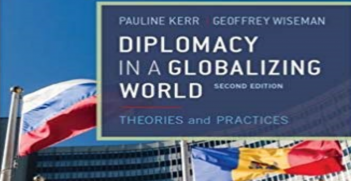How Personality has Shaped Australia’s Foreign Policy

Diplomacy is as much a game of personality as it is policy. Australia’s success as a middle power on the global stage has often benefited from the social skills of a handful of officials.
As the world stands in awe of Ukrainian President Volodymyr Zelenskyy, and equally in horror of Vladimir Putin and his foreign minister, Sergey Lavrov, we are provided a prime example of how character and personality is intrinsic to every aspect of foreign policy.
Over the past decade the Australian prime minister’s office has often been depicted as a revolving door, but there has been one role in government that has remained stable, and it is arguably the most important – the foreign minister. Australia is a middle-power vying for a voice on the international stage. Australia competes in a crowded field, and every relationship counts. As a result, the likeability of leaders and the regard in which they are held matter more than ever.
When Julie Bishop became Australia’s 38th foreign minister, she established herself as a force to be reckoned with. Her reputation quickly spread in the diplomatic world, particularly when spearheading Australia’s campaign at the United Nations to condemn Russia’s downing of flight MH17. Bishop had both the intellectual rigour and personality to succeed in the role. Her efficient form of diplomatic networking and relationship building was well known, bolstered by a rolodex the envy of many. A quick-fire text from Bishop was usually met with a rapid response from both her counterparts and world leaders. A phone call, a WhatsApp message, or text via a litany of other encrypted messaging platforms meant that Australia always had its ear to ground 24/7 – Bishop spent close to a decade, first as the shadow foreign minister, before taking government and the portfolio proper.
This is where personality matters. As Daniel Flitton of the Lowy Institute has noted, the traits of leaders matter as much “as the great strategic contours and power politics that can shape decisions.” The regard in which a leader — be it the prime minister, or the foreign minister — is held, sets the stage for the willingness and speed with which other states consider cooperation and engagement. It is a fundamental tenet of human nature that you have a preference to work with someone you like, trust, or respect.
For larger powers — namely the US, China, Russia, and so on — while leaders do profoundly shape the reputation and perception of their countries, it is their size and importance, be it economic, military, or both, that means they will always have a platform to be heard. For Australia it is more difficult.
Australia is a middle power vying for a voice on the international stage. Abrasive personalities and the mismanagement of diplomatic relationships risk Australia’s effectiveness on the global stage. Just think back to Bob Carr’s tenure as foreign minister, accurately dubbed “former minister for nothing” by Peter Hartcher, which became more painfully evident after the publication of his sanctimonious celebration of all things Bob Carr, titled “Diary of a Foreign Minister.”
When Malcolm Turnbull became prime minister in 2016, so entered another politician with a knack for fostering relationships with international partners. This became painfully apparent to current Prime Minister Scott Morrison as Turnbull’s friendship with French President Emmanuel Macron found itself to be a lightning rod for media attention throughout the chaos of the 2021 AUKUS submarine deal. Turnbull himself was caught in an infamous clash of personalities during a phone call with then US President Donald Trump, providing an example of how the personalities of leaders can gravely alter the perception of the strength of long-term bilateral ties.
In the end, Australia was able to effectively navigate the treacherous diplomatic waters and establish a close relationship with the Trump administration. A lot of credit belongs to the politically savvy and astute operations of the Australian Embassy in Washington, led by Arthur Sinodinos, who then went on to rectify a perception of Republican favouritism with the current Biden administration. Sinodinos proved the inherent value of a diplomatic appointee who both understands, and had lived by, the sword of politics.
Managing the myriad of international relationships is a complex task to start with, but as German sociologist Max Weber argues, madness is not merely a manifestation of high office, it is an essential part of it. The art of diplomacy, particularly behind the curtain and away from the public eye, requires careful management and understanding of the personalities involved. Australian High Commissioner to the United Kingdom and former Attorney General George Brandis has a saying: “politics attracts the weird and wonderful.” Politics and diplomacy are overlapping worlds. This is why a fair amount of focus is placed on the creation of biographies that capture the personality traits and history of key individuals — more detailed than one would see on a resumé.
With Bishop’s departure from politics, Senator Marise Payne became Australia’s foreign minister. In this time, Australia has continued to stand brave in the face of diplomatic headwinds, taking Beijing to task over its opaque handling of COVID-19 and continuing to stand up to the extraordinary degree of diplomatic and economic coercion. But Payne’s more media-shy style has added to the rumours that Australia’s foreign policy decision making is now largely driven from the Prime Minister’s Office. The same is true of the apparent marginalisation of the Department of Foreign Affairs and Trade (DFAT), which many fear is to the detriment of long-term strategic foreign policy planning.
Looking forward, one would be foolish to presume the outcome of Australia’s impending federal election. However, if Labor was to win office, Australia should be ready to welcome a strong pick for Australia’s next number one diplomat.
Both political parties advocate for continuity of Australia’s major foreign policy settings, as noted in recent speech by the leader of the opposition, Anthony Albanese. However, it is Senator Penny Wong’s long tenure as shadow foreign minister and her respected political and diplomatic acumen places Australia in good stead. Long political rivals, both Bishop and Wong would wince at being compared, but both have much in common.
Philip Citowicki is a Non-resident Vasey Fellow at Pacific Forum and an Australian foreign policy commentator.
This article is published under a Creative Commons License and may be republished with attribution.





